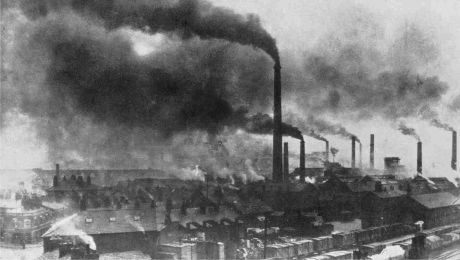Features
You are here
Why Marx matters: capitalism and the Metabolic Rift

August 10, 2019
CO2 was identified as a prime driver of global warming in the 1950s and has been the subject of many international meetings over the past 30 years. Despite increasing calls to reduce carbon emissions, they continue to rise faster and faster.
This is part of a planetary crisis that includes; a high species extinction rate; chemical pollution of land, water and skies; ocean acidification; freshwater consumption; nitrogen and phosphorus pollution; and more. With such existential crises looming, why are governments and economic leaders not acting to stop the destruction of the life support systems of the earth?
Many people are mobilizing to demand action, and growing numbers see the system’s drive for profit as a big part of the problem. But most are likely unaware of the ecological core of Karl Marx's critique of capitalism.
Marxism’s ecological credentials are tarnished by association with the USSR and other states that had terrible environmental records. So we must go back to Marx’s writings to reclaim the ecological core of his critique of capitalism: the Metabolic Rift.
Marx studied the ancient Greek materialist philosopher Epicurus whose ideas had been influential to the scientific revolution. Marx also studied the German Idealist philosopher Hegel, whose dialectic saw change coming about through conflicting ideas being transcended in a new synthesis. Marx's insight was to turn Hegel's Idealist dialectic on its head and root it in material reality.
In 1844, in the Economic and Philosophical Manuscripts, Marx wrote of how "the whole of nature" was an "inorganic body" for human beings: "(1) as a direct means of life and (2) as the matter, the object and the tool of [human] activity." Human beings live from nature, and they "must maintain a continuing dialogue with it" if they are not to die. That human "physical and mental life is linked to nature simply means that nature is linked to itself, for [humanity] is part of nature."
Thus the labour process "is the universal condition for the metabolic interaction between [humans] and nature, the everlasting nature-imposed condition of human existence." For Marx, this was the key to human nature.
Early humans foraged and hunted in egalitarian groups, working to sustain the environment they relied on to survive. With the rise of agriculture, where there was a surplus a layer of society could emerge to manage it on behalf of all society and sometimes become a new ruling class.
Before capitalism, most labourers had a direct relationship to the land, and had an interest in maintaining the long-term fertility in the soil. The development of private property in land, and the enforcing of it through the enclosures by fences and hedges over hundreds of years in England, forcibly removed peasants from the land. At the same time, a rising capitalist class operated textile mills and other factories, and the paupers newly freed from the land, formed the bulk of the emerging working class.
Under capitalism, exploitation of workers is the source of profit. Starting with the alienation of the worker from the products of labour, Marx’s posited further “moments” of alienation: from the production process; from other workers; from one's own human nature and from the natural world. These ideas were integrated into his critique of capitalism.
Marx closely followed the developing science of soil chemistry that was developed by Liebig. This is the context in which Marx introduced the idea of the metabolic rift in his major work Capital:
"Large landed property reduces the agricultural population to an ever decreasing minimum and confronts it with an ever growing industrial population crammed together in large towns; in this way it produces conditions that provoke an irreparable rift in the interdependent process of social metabolism, a metabolism prescribed by the natural laws of life itself. The result of this is a squandering of the vitality of the soil, which is carried by trade far beyond the bounds of a single country (Liebig).”
“Capitalist production, therefore only develops the technique and the degree of combination of the social process of production by simultaneously undermining the original sources of all wealth - the soil and the worker.”
The crisis in soil fertility prompted the scramble to mine for phosphates, potash and nitrates in the 19thcentury. The crisis was “solved” by the development and application of effective artificial fertilizers during WWI, and later mechanization. But these just raised the metabolic rift to a new level, as capitalist agriculture became a process requiring inputs of nutrients and oil and producing waste in industrial proportions.
Energy production under capitalism also demonstrates the metabolic rift. The development of the coal-fired steam engine enabled the switch from water power allowing factory owners to build anywhere and operate for longer each day, maximizing profits. Oil provided even more advantages, being even more portable.
Downstream chemical and plastic industries feed off the oil industry infrastructure, which is so integrated with the economy that Canada spends billions every year subsidizing the oil and gas industry, building roads and buying pipelines. The profit drive prevents governments and companies from effective action, even as the warnings get direr.
In the Communist Manifesto, Marx and Engels compared capitalist society to "a sorcerer who is no longer able to control the powers of the nether world whom he has called up by his spells".
The spell can be broken by the power of the working class through revolutionary action to shut production down; or reorganized it to produce what we need for a sustainable and livable planet for all by breaking the rule of those who run a system that would destroy the earth in the name of profit.
Section:









